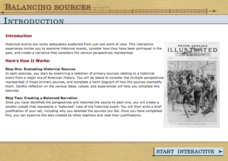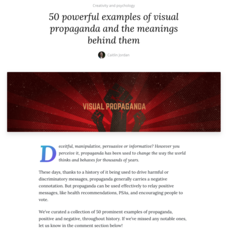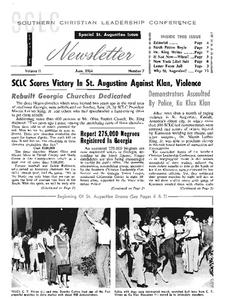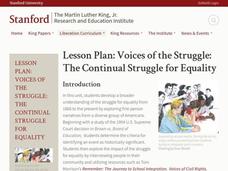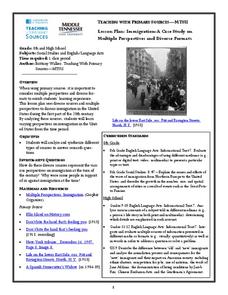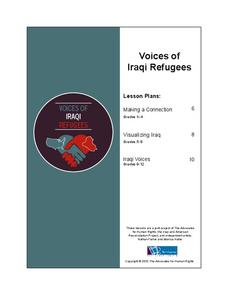National Constitution Center
Federalism, the Commerce Clause, and the Tenth Amendment
How do the state and federal governments relate to each other? The Constitution has a lot to say about that! Using an interactive online tool, pupils explore the Tenth Amendment. They apply their knowledge to political cartoons and news...
National Constitution Center
Voting Rights since the Fifteenth Amendment
What does it mean to have the right to vote? To what extent have interpretations of the Fifteenth Amendment changed over time? Young historians examine and analyze primary source documents, an interactive website, and historical analysis...
Historic New Orleans Collection
Exploring Primary Sources: Music in New Orleans
Looking for a new and exciting way to teach young historians the art of primary source analysis? Jazz up your lesson plan with a resource that asks class members to analyze photos, travel documents, and letters written by some of New...
PBS
Using Primary Sources: Wide Open Town
A picture speaks a thousand words, no matter how old! Scholars use political cartoons from the era of Prohibition and the Temperance Movement to analyze what, a primary document (in this case, a bootlegger's notebook) is telling them...
PBS
Rosa Parks: Civil Rights Activist
Scholars examine the courageous efforts made by civil rights activist, Rosa Parks. Discussion questions and a brief writing assignment follows a short film. A photograph and a silent film delve deeper into Park's history and three...
The New York Times
Teaching the Vietnam War with Primary Sources from the New York Times
Use the New York Times database of primary sources to teach a unit on the Vietnam War. The resource consists of a variety of primary sources as well as a lesson plan showcasing how to teach a instructional activity using them. Pupils...
Annenberg Foundation
Balancing Sources
Pupils turn into investigative reporters throughout history to learn what it takes to balance different primary sources on the same topic. They use what they learn to create a narrative based on their own interpretation of a historic...
Canva
50 Powerful Examples of Visual Propaganda and the Meanings Behind Them
Propagandists have many tools at their disposal to influence thinking and behavior. Among the most powerful are the visual tools, posters designed to grab the attention and stir the emotions of viewers. Check out this collection of...
Freedom Archives
Special St. Augustine Issue
The articles and images in the June 1964 edition of the Southern Christian Leadership Conference Newsletter detail the events in St. Augustine that were instrumental in the passing of the Civil Rights Act of 1964. The stirring images and...
PBS
1000 Words
A picture really can speak a thousand words—no matter how old! Scholars become history detectives as they learn how to analyze historical photos and evidence to uncover the past. The fun hands-on activity makes history come alive through...
University of Virginia
Illustrating Uncle Tom's Cabin
Historical illustrations reveal more than what they are meant to portray. After reading Harriet Beecher Stowe's Uncle Tom's Cabin, high schoolers view a series of illustrations, movie posters, photographs, and book covers that exemplify...
Stanford University
Voices of the Struggle: The Continual Struggle for Equality
As part of a study of the Civil Rights Movement from 1868 to the present, class members examine first person narratives, the Supreme Court case Brown v. Board of Education, and other significant events in civil rights history. They then...
American Battle Monuments Commission
The Great War: U.S. Division Under Allied Command
The victory of Allied forces in World War I is due in large part to the continued collaboration and support of the Allied divisions themselves. Learn more about the ways Australia, Britain, France, and the United States worked together...
American Battle Monuments Commission
The Sicilian Campaign
The summer of 1943 saw Italy transition from a fascist state in an Allied campaign that eventually became a liberation. Explore the ways Canada, Great Britain, the United States, and the Northwest African Air Forces collaborated to put a...
American Battle Monuments Commission
The Great War: A Visual History
Immerse yourself in the military operatives of the Great War with an interactive timeline and map. As high schoolers click on each year of World War I, they can select individual battles, campaigns, troop movements, and notable victories...
American Battle Monuments Commission
The Battle of the Atlantic
World War II is known for its land and air battles in Europe, but the waters of the Atlantic saw its share of skirmishes from 1939 to 1945. Learn more about the roles of the Allied powers in establishing ocean territory during World War...
American Battle Monuments Commission
Liberating Rome: The Anzio and Rome-Arno Campaigns
Follow the liberation of Rome in both time and space with an interactive timeline and map. As class members click on various icons on the map, they can track different countries and their troops during the Anzio and Rome-Arno Campaigns...
American Battle Monuments Commission
Flying Yanks: American Airmen in World War I
Their boots may not have been on the ground, but military airmen in World War I made a lasting impact on the global conflict. A thorough interactive resource takes learners through a timeline of events, campaigns, and battles with...
University of California
The Civil War: Secession of the South
Was the Southern states' decision to secede from the Union protected by the United States Constitution? Eighth graders discuss the constitutionality of the South's justification for secession, particularly the secession of South...
Middle Tennessee State University
Lesson Plan: Immigration: A Case Study on Multiple Perspectives and Diverse Formats
As part of a case study of U.S. immigration during the first part of the 20th century, class members examine a variety of primary sources that present multiple perspectives of the responses of those in favor of immigration and those...
Advocates for Human Rights
Voices of Iraqi Refugees
The stated goal of this resource is to provide learners with basic facts about and build empathy for Iraqi refugees. To do so elementary classes develop a plan for how to welcome refugees to their classroom. Middle schoolers read...
Tennessee State Museum
Understanding Women’s Suffrage: Tennessee’s Perfect 36
Tennessee was the pivotal state in ratifying women's suffrage in 1920, with its vote coming down to one man: Harry Burn, a 24-year old state representative who changed his nay to an aye on the advice of his mother. Learn more about...
NPR
Progressive Era Lesson Plan
The women working for equal rights in the early 20th century weren't a part of one large group; rather, they were members of dozens of small groups focused on social reform. Explore the ways groups in the Progressive Era like National...
Library of Congress
Industrial Revolution
Could you live without your phone? What about cars, steel, or clothing? Class groups collaborate to produce presentations that argue that either the telephone, the gramophone, the automobile, the textile industry, or the steel industry...








